#language: constructed
Explore tagged Tumblr posts
Text
youtube
This week's UTAU original song is Yorudake by Jamsanpoid featuring Umizuki Kurage. The song is written/sung in a constructed language.
3 notes
·
View notes
Text
This English teacher translated Capcom’s Monster Hunter language, and it only took 2,000 hours (msn.com)
Just thought anyone would be interested in this.
#mvtjournalist speaks#conlanging#language construction#language creation#glossopoeia#conlang#constructed language#fictional language#fanlang#fandom language#monster hunter#monster hunter rise#monster hunter world#monster hunter wilds#monster hunter stories#monster hunter conlang
694 notes
·
View notes
Text
hey therianblr, ive decided im gonna make a conlang just for therians. and im only going to let therians or alterhumans learn it. if youre interested, dm me (or if you have ideas on how it should sound) :3
the concept is similar to things like pig latin, its a language for a certain group of people, and that group does not want outsiders to learn their language so were gonna basically have our own language to ourselves! but that also means well have to regulate the resources used to learn it since its not meant for non alterhumans
if ur a therian PLEASE reblog this so more therians can know and help me out! pls an thx
#therian#therianthropy#therian stuff#therian things#alterhuman#conlang#constructed language#therianblr#therian blog
924 notes
·
View notes
Text
An interesting dichotomy

I found these two replies right next to each other, under a tweet where a non-binary person was discussing their use of "AFAB" in a thread about how much scarier it is to be "homeless and AFAB"--due to the compounded risk of sexual violence, amidst other harms.
It's an interesting look into how despite vocal, performative opposition to "TERFs" and transphobia, when you really boil down people's beliefs--even queer people--most do believe that trans women's presumed anatomy spares us from the worst excesses of misogynistic violence, or exempts us entirely.
Meanwhile, if you bother to look at the leading causes of death among impoverished, precarious, homeless, usually non-white trans women, you might have a somewhat different idea of the supposedly magical ability of the "male apparatus" to spare individuals from sexual violence and brutalization.
Freedom from misogynistic violence is not, I fear, stored in the chromosomes.
#transfeminism#gender is a regime#materialist feminism#sex is a social construct#social constructionism#feminism#lesbian feminism#transmisogyny#cissexism#bioessentialism#the supposed distance between terf rhetoric and inclusive language
392 notes
·
View notes
Text
@ Conlangers out there
who among the hordes of tumblr has developed their own conlang?
323 notes
·
View notes
Text
All gender is made up but my gender is more made up than yours because I am a conlanger.
#linguistics#linguistic#languages#shitpost#lingblr#linguist shitpost#conlang#conlanging#constructed language#conlangs#gender#trans
152 notes
·
View notes
Text
I firmly believe that Tolkien had a secret soft spot for Sauron. Why? Hear me out...
If there was something more special and important - even sacred - to Tolkien other than writing, it was definitely con langs (constructed languages). Tolkien talks fairly extensively about the religious and sacred implications of con langs for him as part of Sub-Creation, and it's also obvious that it was his most special personal hobby. The entire world of Arda was born from Tolkien's con langs, rather than the other way around. Middle-earth would not exist without con langs.
That beings the case, you'd think that we'd see lots of examples of con langs within the Legendarium. But we don't. In fact, we only see one con lang within the Legendarium, and only one being who, like Tolkien, is a con-langer.
And that, of course, is Sauron with the Black Speech.
Not Feanor. Not Beren. Not Bilbo or Aragorn. Not any of the other characters who were Tolkien's "favorites" to whom you might expect Tolkien to give his beloved hobby.
No, it's Sauron.
Tolkien gave to his villain his most beloved and sacred hobby. (He also made Sauron a poet, which is another very personal and special hobby of Tolkien's.) That would be like me creating a villain and then making her a Children's Librarian who writes redemption fanfiction on the side. There is no way that was not a deliberate choice on Tolkien's part.
There's also the way Tolkien writes about Sauron (particularly in "Morgoth's Ring") but that's a post for another day. But I think Tolkien's choice to make Sauron a con-langer (and the ONLY known true con-langer in Arda) speaks to some fondness or love Tolkien had for that character.
#silmarillion#lotr#lord of the rings#tolkien#jrr tolkien#sauron#mairon#constructed language#arda#tolkien's legendarium
203 notes
·
View notes
Text

104 notes
·
View notes
Text
One day i will get myself together and write a long post about TLOVM season 3 cause i have Opinions and Thoughts but general i was kinda disappointed with this season and i think it could've been better
But for now i'll just say one thing: i really miss the friendship between Percy and Keyleth. In the campaign they're literally best friends. In TLOVM they barely interact. I really don't get it. Why did they think it wasn't important enough to include.
And in general platonic relationships (aside from family ones, like the twins and Scanlan and his daughter) get little to no screentime in TLOVM and it frustrates me. No hate but like... Vox Machina is not just "3 couples and Grog"
#not much of a constructive criticism just my personal opinion and my personal feelings#sorry for any mistakes english is not my first language#the legend of vox machina#tlovm#tlovm season 3#the legend of vox machina season 3#percy and keyleth#percy de rolo#keyleth
106 notes
·
View notes
Note
I have no other place to yap this to so I apologise in advance.
I find it interesting in Alhaitham and Kaveh’s voicelines they tend to talk about each other A LOT in a way of complaining. Such as in Alhaitham’s Good night voiceline where he says that he’d prefer that Kaveh wouldn’t be home at all because all the chaos and noise he makes in the dead of the night. Or in Kaveh’s Good Morning voiceline where he says that he hopes that you don't run into someone who ruins your day first thing in the morning.
I guess it’s what makes other people think that they despise each other’s company. Yet they’re always viewed as a pair and Alhaitham could’ve kicked Kaveh out of the house ages ago. But what’s your opinion on that?
Hiya! there's no need to apologise, this is a safe space for all haikaveh! When I tell you your ask is scratching my brain I mean ITCHING, I have so many thoughts about this part of their dynamic so thank you for enabling me <3 This turned out to be rather long, so I hope it’s helpful to you!
The contention in both Alhaitham and Kaveh’s character stories and voice lines seems to be to create intrigue about the two as individuals, and, in turn, their relationship.


Alhaitham’s ‘good night’ voice line instantly serves as a contradiction to his character. It’s interesting, and telling, that Alhaitham, who is essentially Kaveh’s landlord, and mentions this within his fourth character story, alludes to Kaveh by using ‘roommate’ rather than ‘tenant’. ‘Landlord’ evokes a position of authority over the tenant, whereas ‘roommate’ indicates an equality between two people sharing a house – since it’s Alhaitham who advocates for the term ‘roommate’, it’s telling that, as opposed to what Kaveh believes, Alhaitham wants to establish equality between them.

In terms of what Alhaitham says in this voice line, it explicitly raises a contradiction in the form of a question: if Alhaitham is truly bothered by his roommate’s antics, why doesn’t he simply evict Kaveh?
This is relevant as this question is also posed when we initially meet Kaveh within the Archon Quest, as Kaveh states he dislikes Alhaitham’s personality, to which Alhaitham responds by saying if he bothers Kaveh so much, Kaveh always has the option to move out of the house – to which Kaveh perceives as a threat, only to then dismiss this as Alhaitham ‘changing the subject’, which seems to mean that this ‘threat’ is taken as baseless. As this isn’t called back to, this seems to be the case.


There is no real threat of eviction, and regardless of their disputes, Alhaitham ultimately gives Kaveh no ultimatum to move out. In fact, as discussed here (page 27), as we are meeting Alhaitham and Kaveh for the first time, Alhaitham allowing Kaveh to live with him contradicts his established character of living a life free of inconvenience. This instantly creates intrigue around his and Kaveh’s dynamic – who is Kaveh to Alhaitham for this exception to be made to Alhaitham’s peaceful way of life?
(An additional note of interest is that Alhaitham’s solution to the noise problem seems to be more uncomfortable than calling on Kaveh and telling him to stop his work. Alhaitham says that he’d rather not wear his noise-cancelling earpieces to bed, implying that he does so when noise is a problem at night. However, there’s no mention of Kaveh being stubborn when confronting this issue, which is why he takes to wearing his ear pieces, or any mention of confrontation at all. From this voice-line, it seems that Alhaitham avoids interaction by opting for the least comfortable option, which can be a contradiction to his character. As this is a rather brief voice-line, it’s difficult to ascertain why, but I like the idea that Kaveh is productive at night, and Alhaitham prefers not to impose on Kaveh’s work process – but this is more a headcanon than evidenced interpretation.)
Returning back to the contradiction within this voice-line, at a surface glance, this does appear to be a general complaint about Kaveh, and this can be found in Alhaitham’s lines about Kaveh, and also when discussing Tighnari. Alhaitham refers to Kaveh as ‘overly sensitive’, and ‘constantly making a fuss’.
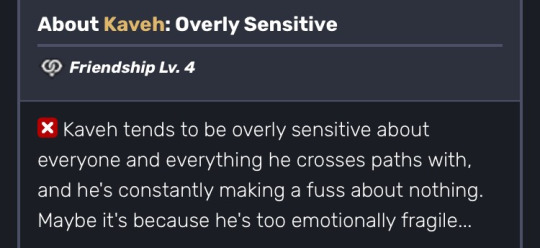
These can easily read solely as complaints, but when looking to the original CN translation, another interpretation can be found here. Alhaitham describes Kaveh as ‘caring’ or ‘tender’, which is exactly how Kaveh is described within the 3.6 special program (as per minimushiroom on twt), which can allude to how Kaveh is considerate to a fault, in that this serves as a detriment to himself.
This can be seen in Alhaitham’s other Kaveh-centred voice-line, in which he describes Kaveh buying keychains in order to provide meals for sick children, even though healthcare is free in Sumeru. Alhaitham clearly holds the view that this was a redundant action, as Kaveh, being in debt, most likely doesn’t have the money to spend on such investments that are, evidently, dubious.
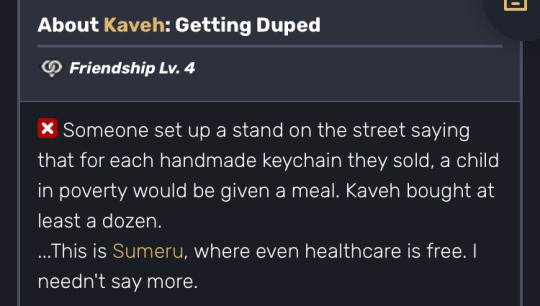
As Alhaitham provides a rational view here, this contrasts with Kaveh’s act of generosity fuelled by emotion – which highlights the contention Alhaitham has with Kaveh, in that Kaveh places himself in dangerous situations for the sake of others. However, as this can be perceived as a solely derisive line, this essential context is lacking, and can be easily misconstrued. (I think the EN translation here also coincides with this narrative, as minimushiroom notes that the original CN has Alhaitham refer to Kaveh’s sensitivity in a positive way, rather than contemptuously, as the English can be interpreted as.)
Kaveh, similarly, can be seen to complain about Alhaitham in his own voice-lines. This can be seen in the 'Good Morning' voice-line you've mentioned, where Kaveh complains about having to see Alhaitham in the morning, which 'ruins' his day. Additionally, Kaveh's voice-lines discussing Alhaitham refer to Alhaitham as ‘infuriating’ and not wanting to give Alhaitham the satisfaction of thanking him, despite Alhaitham helping him out. However, there is more nuance in these voice-lines than Kaveh simply ‘disliking’ Alhaitham, as this dislike is never stated - rather that he and Alhaitham have a difficult relationship in comparison to the ‘close’ friendship of their past.


Kaveh describes their relationship being a ‘mixed bag’, of both negatives and positives, as well as establishing a thorough understanding of Alhaitham, where other people may misinterpret Alhaitham as they ‘don’t know him well enough’. Additionally, Kaveh notes that he knows that Alhaitham can present himself in a more ‘likeable’ manner, but that Alhaitham refuses to do so, which refers to Kaveh’s contention with Alhaitham discussed within his character stories. This, in turn, generates curiosity, as it appears that Kaveh holds an in-depth knowledge of Alhaitham that the player isn’t privy to.
Referring back to Alhaitham’s ‘Good Night’ voiceline, the question raised is, if Alhaitham has a problem with Kaveh, why doesn’t he just evict Kaveh? And the answer can be found by digging further into Alhaitham’s character stories. Looking to Alhaitham’s fourth character story, it states that he is aware of the dissatisfaction Kaveh may have with their living arrangement but that ‘it matters not to him’.
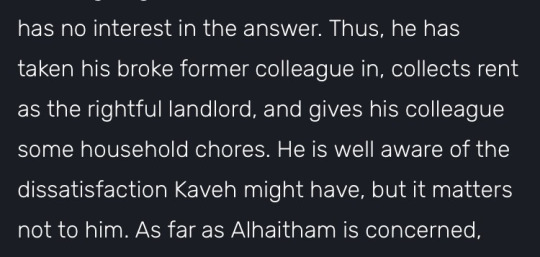
This means that he is aware that Kaveh may be unhappy with having to rely on someone else for a stable livelihood, something which his pride doesn’t naturally allow, but that this is also exacerbated due to their previous falling out and the current contentions Kaveh has with him.
At first, this can seem rather abrasive, which does fall in line with Alhaitham’s egoism as this doesn’t directly impact ‘the self’ (discussed further here), however, what immediately follows is Alhaitham’s belief that he and Kaveh are mirrors, in that his own perspective of the world will be enhanced - in the og CN, ‘completed’ -by Kaveh’s own world view.

The implication generated here with the explicit term ‘mirror’, is that, just as Alhaitham benefits from Kaveh, Kaveh, in turn, can benefit from Alhaitham. (As a side note, it is interesting then that the voice-lines in question can be seen to mirror each other – Kaveh mentions Alhaitham in ‘Good Morning’ whereas Alhaitham mentions Kaveh in ‘Good Night’.)
Returning back to Alhaitham’s character story, rather than merely reflecting each other philosophically speaking, I’d say that this also points to their respective progression as people, not just scholars.
To me, this is reminiscent of what Alhaitham says to Kaveh in A Parade of Providence – being ‘correct’, ultimately, doesn’t matter, as there is no ‘correct’ path in life, meaning that there is no ‘correct’ philosophy to shape and guide a person. Rather, Alhaitham asserts that, ultimately, their opposing philosophies are not the issue that exists between them.


The issue that does exist, then, can be surmised from Alhaitham’s actions during the event (discussed further here), in which he researches into Sachin to gauge his influence over Kaveh’s father journeying into the desert, with implicit hopes of providing closure for Kaveh, and potentially assuaging Kaveh’s guilt. This is a personal act with a personal motive; the underlying motive being concern, as opposed to an assertion of ‘correctness’.
In my opinion, I think Alhaitham’s actions during A Parade of Providence are a direct reference, and fulfilment, of Kaveh’s fifth character story. I’ve discussed here that the main reason for the ending of their friendship was them asserting the correctness of a philosophy over the other, and proposing one philosophy as the ‘solution’ to the other’s perceived flaws.
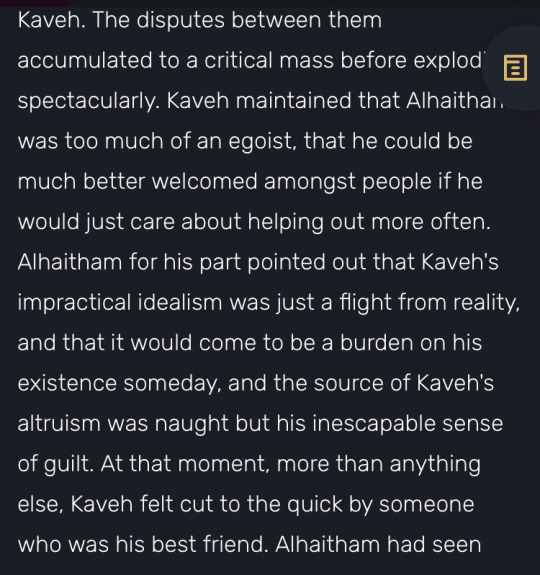

Here Alhaitham can be seen to use Kaveh’s past as the reason for his excessive altruism, implicitly referring to Kaveh’s guilt over being the supposed catalyst for his father’s demise. This final comment of Alhaitham’s appears to be the first time this has been mentioned between them, and it’s enough to be perceived as weaponisation – leading to Kaveh severing their friendship.
In A Parade of Providence, Alhaitham is shown to only have taken the role of commentator to research into Sachin, whose research we are told (by Kaveh), he has no explicit interest in, and it is heavily implied that the only reason he looked further into Sachin, was to prove to link between Sachin and Kaveh’s father. Alhaitham seems to want to absolve Kaveh of this past guilt in hopes that Kaveh will stop placing himself in the cycle of self-sabotage.
For me, when viewing this as a parallel, it highlights that Alhaitham’s motivation in speaking out during their days as students was out of concern for Kaveh, although while holding egoism as ultimately beneficial, and therefore perceivably ‘correct’. The ‘issue’ they’re currently debating is not expressly stated, and although it is unclear if Kaveh understands the implication (as discussed here), as ‘correctness’ has been overturned, there seems to be little left than the personal.
Relating this back to Alhaitham’s fourth character story, for me, Alhaitham referring to Kaveh as a mirror isn’t just referring to Kaveh as a scholar, but a person as a whole. As Alhaitham seeks to improve himself, personally, through Kaveh, it seems that he hopes to be able to benefit Kaveh in turn.
As for Kaveh’s complaints regarding Alhaitham, these can be contextualised within his own character stories. As Kaveh ultimately severed the friendship between him and Alhaitham, Alhaitham offering Kaveh to live with him, despite Kaveh revoking his previous understanding of Alhaitham (as discussed here, page 67), causes Kaveh to be overtly suspicious.
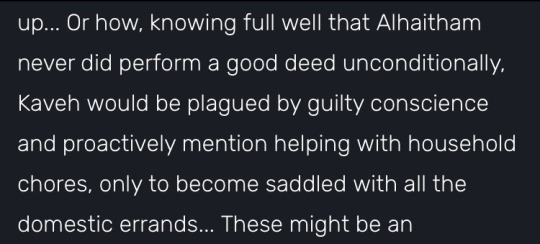
In Kaveh’s Old Sketchbook, it is mentioned that Kaveh believes there to be an ulterior motive for Alhaitham inviting him to share a house, as he believes that Alhaitham wouldn’t do something for someone else without an exchange.
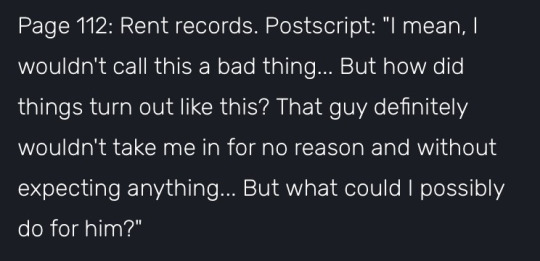
Kaveh, then, openly distrusts Alhaitham due to this unspoken motive, and although he takes on chores to ease his sense of guilt of being a perceived burden, a contention arises here. Due to their previously ended friendship, and with how Alhaitham hurt Kaveh, and how Kaveh may believe he hurt Alhaitham (discussed here), Kaveh sees no reason for Alhaitham to want him around – he treats their relationship as an exchange, asking what Alhaitham could possibly want for him.
Although Alhaitham views Kaveh as a mirror, and therefore, respects Kaveh’s perspectives, Kaveh can potentially view their opposing philosophies as a negative rather than a positive as he had done in the past (as discussed here), as it, perceivably, was what led to the end of their friendship. In this, Kaveh views Alhaitham as disparaging him and his views. As mentioned in his character story, he has no reservations in telling Alhaitham of his debt as Alhaitham has already seen through him in the past, and yet again, upon meeting at the tavern.
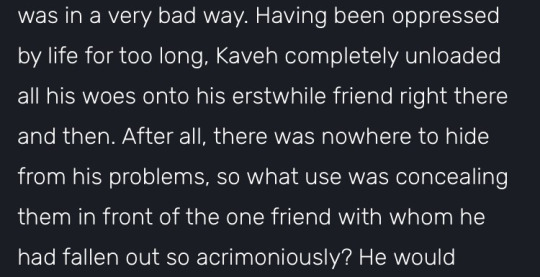
Although Alhaitham perceivably views him unfavourably, and his comments and complaints appear to propagate this interpretation, Alhaitham also seems to have no issue with keeping Kaveh around, and interacting with Kaveh, regardless of the problems Kaveh expressly has with him.
To Kaveh, it could be that as Alhaitham has already seen the worst of him, and appears to have no real issue with their stilted rapport, there is no point in donning a front and using niceties. He is open with his issues with Alhaitham, and, in turn, Alhaitham is open with him.
This appears to be a dual negative and positive for Kaveh, as he describes Alhaitham’s constancy as ‘the most unshakable part of one's past is a friend that will never change’. In this sense, his unsteady rapport with Alhaitham is reliable, and therefore, has no reason to change.

Clearly, there is a large disconnect between Alhaitham’s view of Kaveh and how Kaveh perceives Alhaitham’s view of him. As previously mentioned in the discussion of A Parade of Providence, there is an unspoken ‘issue’ between them, and this can be interpreted as dire misconceptions borne from miscommunication.
As discussed, Kaveh and Alhaitham reference each other a lot in their respective voice-lines and their character stories. This alone is enough to connect them, regardless of the cruciality of their mirror motif, as they are key figures of each other’s past, present, and seemingly, future. Despite this, it’s as you say, there’s a common perception to view them as mutually disliking each other, and, to me, this is based upon their first initial interaction, and the way they refer to each other in their own character stories and voice-lines.
It’s notable that Alhaitham refers to Kaveh in his voice-lines when Kaveh is not explicitly relevant, such as in his Good Night voice-line, and, most interestingly, when Alhaitham discusses Tighnari.

This could be because Alhaitham knows of Tighnari through Kaveh, but as this connection isn’t stated, it reads as Alhaitham mentioning Kaveh for no other reason than to complain about his perceived naivety regarding relations with others. But as this is a voice-line designated to discussing Tighnari, it’s interesting, and incredibly noticeable, that Alhaitham then discusses Kaveh instead. It’s similar to what Kaveh can be seen to do, and is observed to do by others, in relation to discussing Alhaitham.

When it comes to Kaveh, however, his complaining of Alhaitham can be seen to link with his process of dealing with troubles in his work. In his Hangout, he states that he takes his work to heart because he cares about it, which is expressed in the same quest in which Kaveh and the Traveller run into Alhaitham in the House of Daena (discussed further here, page 219).
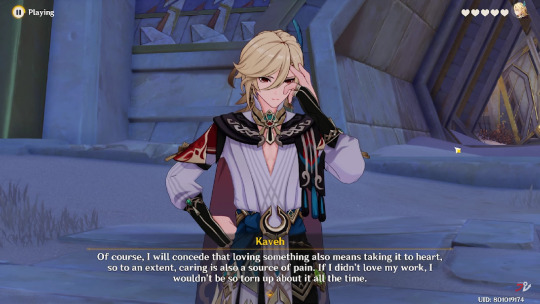
Drawing a parallel here can further contextualise Kaveh’s complaining of Alhaitham – if Kaveh truly disliked Alhaitham, there seems to be no reason for Alhaitham to remain so relevant to him, both in conversation, and in private thought. Additionally, Kaveh is described as an empathetic person, and when dealing with others, he is thusly seen to look for another perspective rather than act on his own subjective perspective.
Looking at his voice-line on Dori, for example, expresses his distaste for Dori pressuring him for Mora due to his debt, however, he also empathises with her, and states that he senses there must be a reason why Dori acts in such a way.

In contrast, this empathy can be perceived as missing in his treatment of Alhaitham, and therefore Kaveh complaining about Alhaitham can be perceived as blatant dislike – which contradicts Kaveh’s benevolence and empathy, which A Parade of Providence particularly stresses.
Kaveh’s treatment of Alhaitham can be seen as deliberately contradictory, as it can cause the player to question why Kaveh reacts in such a singular way to Alhaitham, just as why Alhaitham reacts in a singular way to Kaveh.
In reference to Alhaitham, whilst Alhaitham tends to complain about Kaveh in turn, his actions reveal him. He invites Kaveh to live with him, gives no eviction date, pays for Kaveh’s tabs willingly, (supposedly) buys wine as an apology, and goes out of his way to ensure dialogue with Kaveh – which contradicts his own character stories, in which he appears to favour solitude, and only greets those he considers his friends ‘with a nod or two’.

Moreover, Alhaitham is established as considering Kaveh a necessity to his ‘peaceful life’ he seeks to maintain (as discussed here), and can be seen to implicitly consider Kaveh one of his priorities within his Story Quest.
The idea that Alhaitham dislikes Kaveh seems to stem from Alhaitham being taken literally when voicing an opinion, or an issue, or simply joking, in reference to Kaveh – despite his character stories highlighting that Alhaitham often uses sarcasm in order to subvert expectations.

Alhaitham expressly states that he prefers to be seen as inscrutable, and unknown, by the general public, and uses subversion as a means to do so. In these character stories, Alhaitham openly encourages speculation of his own words.
Without this context, it seems easy to simplify Alhaitham to purely speaking factually when first addressing Kaveh in the Archon Quest – stating that having to explain things to Kaveh is ‘a nuisance’, and yet, it is overlooked that Alhaitham stays in the House of Daena, regardless, knowing Kaveh would find him again.
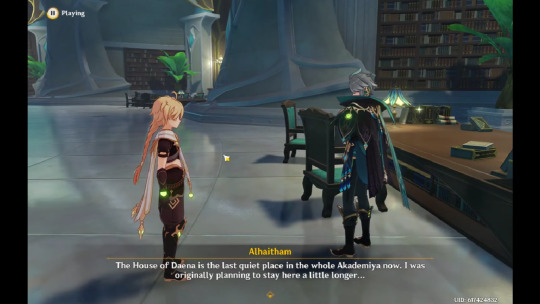
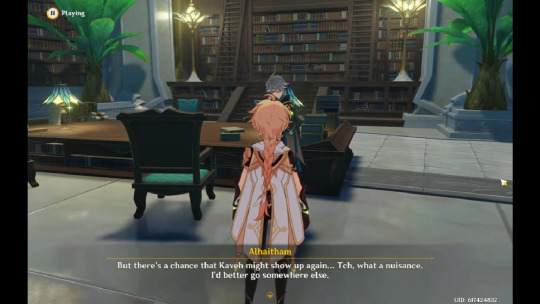
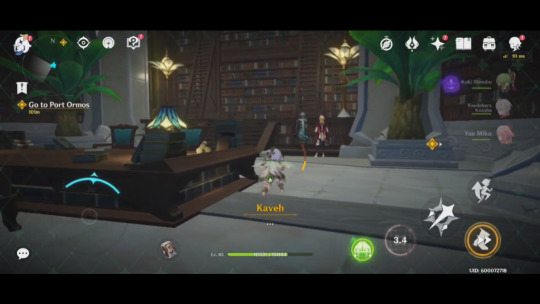
On the whole, in my opinion, Kaveh’s feelings towards Alhaitham cannot be simplified to ‘dislike’ as this is dually an inherent misunderstanding of his character, and of his and Alhaitham’s relationship, just as Alhaitham’s feelings towards Kaveh cannot be simplified to ‘dislike’ for this same reason.
In the beginning, Alhaitham and Kaveh are not supposed to be perceived as friendly, as Kaveh denies the association of ‘friends’, and Paimon describes them to the Traveller as ‘problematic’.

The reason for this is due to their character arcs being intertwined – the core issue is posed in Kaveh’s fifth character story, in that the question is raised if a compromise can be reached, if both sides of the mirror, can be balanced. At the beginning, they are entirely at odds, but even footing must be found.
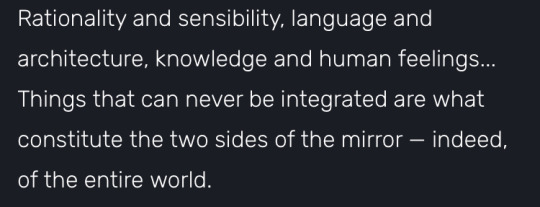
I’ve noticed a shift in online discourse after Cyno’s second story quest, as the progression in Alhaitham and Kaveh’s relationship is noticeable – deliberately, due to the flashback scene within their house (which I’ve discussed in detail here, page 122). To me, it’s more common to form the assumption that Alhaitham and Kaveh dislike each other in the Archon Quest, but with recent developments, and, hopefully, future ones, this perception is being overturned in online communities. Perhaps that’s just wishful thinking, but I’m still hopeful!
#haikaveh#kavetham#alhaitham#kaveh#genshin impact#thank you so much for your ask anon! it really ate away at my brain#haikaveh's writing is just so !?!?!? theres so many layers to peel back so a surface read of their relationship can be misconstrued as toxi#but ultimately i think these voice lines and details of their character stories are for people to question WHY they are Like That with#each other and it's one of the things i love about them that nothing is upfront or simple it really suits their themes so well#alhaitham constantly questions the world around him and flips language on its head and kaveh challenges the world with his ideals but works#with rigid principles of design and construction and he can't tell sarcasm from genuine praise which also adds to why he takes alhaitham's#words so personally... but this is improving now?? i am saying thank you cyno's second story quest <333#also the narrative that haikaveh can't stand each other seems to be more of a western thing from what i've seen online#and i think this is possibly due to the EN translation where the CN is less derisive or abrasive?#thank you to those who translate so the nuance is pointed out! <3
112 notes
·
View notes
Text
[ cw: violence mention / death mention / ]
Will never stop thinking about how Leo, all alone in an endless void and being beaten again and again and again by the only other living thing around, still finds comfort in that space. The situation he was in was completely hopeless, and in any other circumstances he would not have escaped, at least not fast enough to save him from permanent (or even fatal) damage, be it physical or mental.
And yet, despite the bleakness of his situation, despite the agony and helplessness, all he needs is one glance at a crumbled photograph, one glance to remember his family, and that’s enough of a reason for him to smile.
Maybe that’s why his powers center around manipulating space - because no matter how much space is between them, no matter how dire his own situation may be, just the thought of his family, alive and okay, is enough to give Leo hope.
#rottmnt#rise of the teenage mutant ninja turtles#rottmnt leo#rise leo#the prison dimension is horrifying on its own#add in a monstrous being that towers over you and has vowed to ensure your suffering?#god I can’t imagine how scary that is#Mikey opening the portal was a miracle because if he hadn’t managed it there#it’s really up in the air what could have become of Leo#personally I subscribe by the theory that you straight up can’t die in the prison dimension#so it’s a prison in all ways#but the thought of a Leo who manages anyway who adapts and continues to have hope despite it all…#Leo saying he’s nothing without his family is a double edged sword really#because the thought of his family alone is all he needs to live. to hope.#to smile#nothing without them…but they’re EVERYTHING to him#and maybe he doesn’t realize it but…the feeling is mutual#one thing too is that hope that comforts Leo so much is not just that#should he think his family needs help - that hope can turn into determination#I’m unwell about this family#actually on my point of their powers - I truly do think the abilities tie in not only to their personalities#but to their relationship to family and love in general#kinda like love languages in a way#Mikey with his chains and time abilities values being around his family the most - he wants them to experience living in the moment togethe#Donnie is someone who is 100% a gift giver to show his love - his constructs are exactly that aren’t they? gifts of his mind#Raph is someone who willingly bears the weight of the shield - he protects his family like the best big brother possible#and Leo - he goes off on his own a lot but his mind is constantly on his family anyway#like a sailor at sea no matter how far he travels the compass always point in one direction - and for him that compass points home#even if he can’t make it back - it’s still there#and that’s enough
323 notes
·
View notes
Text

I’d watch this rom com
#196#rule#196 campfire#r196#queer#trans#meet cute#mutual pining#ao3#ithkuil#toki pona#conlang#conlangs#constructed language#linguistics#languages
605 notes
·
View notes
Text
***SUBMISSIONS CLOSED! THANKS TO ALL WHO PARTICIPATED!***
LOOKING FOR PARTICIPANTS FOR CONLANGING STUDY!
Calling all conlangers! I’m Eddie (he/they), a conlanger and Master’s student studying applied linguistics. For my dissertation I’m looking to conduct some research on conlanging and the wonderful amazing people that do it! And if you want, you can participate in this research!!!
If you’re over the age of 18 and have made (or tried to make!) at least 1 language, you are eligible to take this questionnaire! And you don’t need any formal linguistics training or knowledge to complete it! I’ll also be conducting a few in-depth interviews (randomly selected), so if you’re interested in that part of the study as well you can indicate your interest in the questionnaire :-)
The questionnaire is on Microsoft Forms and split into two parts, so if you only have time/want to do the first one, it’s no big deal; Part 1 is more general (~15 mins), Part 2 is where you get to gush about a language you’ve made (avg ~20 mins)!
LINKS TO PARTICIPATE: Part 1, Part 2
DEADLINE: I’ll close submissions in June, but if you want to be considered for an interview, get it done by the end of May!
CONTACT: Casual or clarifying questions are welcome via tumblr (edsmore), but if you have more serious inquiries, you can find my university email on the information sheets located in the questionnaire forms.
(obligatory mention that this research is being officially conducted through the University of Oxford; information on data privacy/collection can be found in the information sheet provided in the questionnaire. The official flyer for this study with more information can be found here)
Of course this is all totally voluntary! If you’re interested, I hope to read about some of your cool languages soon!
#linguistics#lingblr#conlang#conlanging#conlangblr#language#constructed language#language construction#internet research#research
244 notes
·
View notes
Text
Anyone know how Duolingo chooses what constructed languages to teach and how we can petition them to teach Grishaverse languages?
Asking for a friend
#grishaverse#duolingo#six of crows#crooked kingdom#leigh bardugo#inej ghafa#kaz brekker#jesper fahey#nina zenik#matthias helvar#wylan van eck#kanej#Wesper#helnik#six of crows duology#constructed language#fantasy language#learning languages#languages#queued
285 notes
·
View notes
Text
Valya Vednesday #4
I’ve been working on a Valya font! It’ll be a while, since there’ll eventually be hundreds of glyphs, but I have the basic set complete:

The earliest form of the Valya script was a syllabary, and these 51 glyphs are the descendants of the original ones. Aside from the i, u, and a glyphs, the rest of these are all still used for CV syllables in modern Valya. (I’m not actually sure if those first three will get used; right now I don’t have any use for them but they might show up in some form or another.)
The other few hundred glyphs are for CCV syllables (with a few exceptions) and are all essentially ligatures of pairs of these ones. Lya (shown at the top) is a ligature of li and a, for example. Most combinations are a little less straightforward, for a couple reasons. One is that there are multiple possible ligatures for most CCV syllables, as there are multiple sequences in Old Valya that result in the same syllable in Modern Valya. Generally, CiCV and CuCV will end up the same, but also due to assimilation and other sound changes there are some Modern Valya syllables that could potentially have eight different sources in Old Valya! In some cases words will be spelled historically (i.e. with a ligature of Ci-CV if that’s the historical form of the word), but in many cases spellings will change for convenience. It’ll be a pretty messy system in the end!
Here are a few sample sentences I was able to construct using only the glyphs I’ve made so far (all the CV syllables plus lya):

I haven’t done any work on kerning yet but it looks like it won’t be as bad as I initially feared—only a few pairs of characters look like they need significant adjustment in the above examples.
Next week I’ll talk about the real and fictional development of this writing system!
118 notes
·
View notes